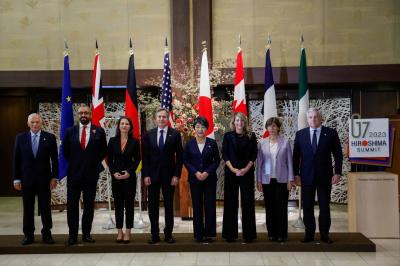Japanese Foreign Minister stated that G7 foreign ministers issued a "unified message" on Wednesday regarding the war between Israel and Hamas, including a call for a humanitarian truce in the fighting and a "peace process," despite ongoing Israeli airstrikes on Gaza. The G7, in a joint statement at the conclusion of a two-day meeting in Tokyo, reiterated Israel's right to defend itself while emphasizing the need to protect civilians and adhere to international humanitarian law. This marks the second joint statement by the G7 since the conflict began after an attack by militants from the Palestinian Islamic resistance movement (Hamas) on southern Israel on October 7, which resulted in the deaths of 1,400 people and the abduction of around 240 hostages. Since then, Israeli bombardment of Gaza has claimed the lives of over ten thousand Palestinians, with about 40 percent of them being children, according to health officials in the Hamas-controlled territory.
Japanese Foreign Minister Yoko Kamikawa told reporters, "I believe it is important that the G7 was able to issue its first unified message in the form of a statement regarding a humanitarian truce and a peace process for the future, both in terms of the G7's responsibility towards the international community and for Japan as the current G7 presidency this year." The statement did not specify the details of that peace process, other than reaffirming that a two-state solution "remains the only way to achieve a fair, lasting, and secure peace." The G7 also expressed its support for Ukraine in its war with Russia, emphasized the need to engage with China on common concerns, and condemned North Korea's missile tests and arms transfers to Russia.
The G7 consists of Britain, Canada, France, Germany, Italy, Japan, and the United States, with the European Union also participating in the group's summit. Israeli Prime Minister Benjamin Netanyahu stated that Israel would consider "small tactical pauses" but argued that it, alongside its close ally the United States and other Western countries, rejected calls for a ceasefire, claiming it would allow Hamas to regroup. The G7 appeared to struggle to agree on a cohesive and unified approach to the war, raising questions about its influence in addressing major crises. The only other statement from the G7 came after a meeting of finance ministers on October 12, which consisted of a few brief sentences, while other members issued their own joint statements.
Divisions within the G7 were also evident at the United Nations, where France supported a resolution calling for a humanitarian truce in the conflict on October 26, while the United States opposed it and other group members abstained from voting.
**Long-Term Plans**
Japan stated that ministers discussed during a working dinner on Tuesday what would happen after the hostilities in Gaza cease and how to revitalize peace efforts in the Middle East. The statement did not provide details about the options being considered if Hamas is ousted from Gaza. Israel's long-term plans for Gaza remain unclear. In some of the early statements regarding this issue, Netanyahu said this week that Israel would seek to take security responsibility in Gaza for an "indefinite period." However, Israeli Foreign Minister Eli Cohen told the Wall Street Journal that Israel wants the area to be overseen by an international coalition that includes the United States, the European Union, and majority-Muslim countries, or managed by local political leaders in Gaza.
Diplomats in Washington, the UN, the Middle East, and beyond are also beginning to explore options. A Reuters report this month indicated that discussions include deploying a multinational force in Gaza after the conflict and forming a temporary Palestinian-led administration that excludes Hamas politicians, while also involving a temporary security and governance role for neighboring Arab countries and temporary UN oversight of the territory.
U.S. Secretary of State Antony Blinken is set to travel to South Korea after Tokyo, marking his first visit in over two years, with his talks expected to focus on strengthening the alliance between Washington and Seoul amid growing concerns about North Korea's military ties with Russia.




